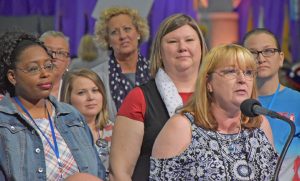 The National Education Association’s annual Representative Assembly is another victim of the COVID-19 pandemic. The NEA Board of Directors recently voted to hold the 2020 RA as a virtual meeting.
The National Education Association’s annual Representative Assembly is another victim of the COVID-19 pandemic. The NEA Board of Directors recently voted to hold the 2020 RA as a virtual meeting.
The RA, originally scheduled to take place in Atlanta during the first week of July, is considered the world’s largest democratic body. Nearly 10,000 delegates from local NEA affiliates around the country convene every summer to pass a budget, debate and vote on action items, and hear from special guest speakers.
OEA has 54 members with credentials for the 2020 RA.
Lily Esklesen Garcia, NEA president, released the following statement on the decision:
“During these difficult times, our first concern is the health and welfare of our students, our schools, our members, and their communities. As the COVID-19 pandemic continues impacting all of us in profound ways, educators continue to be on the frontlines engaging their students, making and delivering school meals to ensure no one goes hungry during this crisis, driving WiFi hotspots on school buses to try to bridge the digital divide, and helping the parents who now better understand what it is to teach their children.
“Public health experts and doctors agree that the best way to stop the spread of this deadly disease is for people to continue social distancing while the country massively ramps up testing, tracing, and social isolation among those who test positive for COVID-19. So far, we have only tested roughly 4 million people in this country, despite predictions by medical experts that if left unchecked, at least 50 percent of the U.S. population will be infected and up to 1.6 million will die. Given that, there is no evidence to suggest that groups as large as the NEA Representative Assembly – known as the world’s largest democratic deliberative body with nearly 10,000 delegates annually – will be safe to convene in the next several months.
“NEA’s Board of Directors has decided to convert the 2020 NEA RA into a virtual meeting, which is our safest option. We cannot take the risk of educators becoming infected and spreading the virus to students, their families and colleagues, or their communities. We look forward to the 2021 RA, where we can hopefully once again come together to set policy and chart the direction of NEA business.
“This crisis has once again shown our nation how America’s public schools not only educate the leaders of tomorrow, but serve as a heartbeat for our communities across this nation. Public schools are the economic engines of tens of thousands of communities that not only provide education, but also jobs and community-sustaining benefits for all Americans. That is why NEA will continue engaging our members and advocating in support of our students, educators, and communities in support of stronger public schools for all of America’s students and communities.”
NEA officials have acknowledged that a virtual RA will have its limitations. Due to the differences among delegates in their access to the technology, reliable WiFi and phone service, NEA could not guarantee every delegate the ability to fully participate in a virtual RA debate and vote. Therefore, the RA agenda will be restricted in the types of actions that can put before delegates to time-sensitive presentations, limited debate and final votes that can be delivered and returned by mail ballots.
More details on how the RA will be conducted will be shared with delegates in the coming weeks. In the meantime, OEA members should address their questions about the RA to Rheta Kennedy, OEA administrative assistant, at rkennedy@okea.org.
